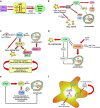Autophagy in cancer metastasis
- PMID: 27593926
- PMCID: PMC5337449
- DOI: 10.1038/onc.2016.333
Autophagy in cancer metastasis
Abstract
Autophagy is a highly conserved self-degradative process that has a key role in cellular stress responses and survival. Recent work has begun to explore the function of autophagy in cancer metastasis, which is of particular interest given the dearth of effective therapeutic options for metastatic disease. Autophagy is induced upon progression of various human cancers to metastasis and together with data from genetically engineered mice and experimental metastasis models, a role for autophagy at nearly every phase of the metastatic cascade has been identified. Specifically, autophagy has been shown to be involved in modulating tumor cell motility and invasion, cancer stem cell viability and differentiation, resistance to anoikis, epithelial-to-mesenchymal transition, tumor cell dormancy and escape from immune surveillance, with emerging functions in establishing the pre-metastatic niche and other aspects of metastasis. In this review, we provide a general overview of how autophagy modulates cancer metastasis and discuss the significance of new findings for disease management.
Conflict of interest statement
The authors declare no conflict of interest.
Figures


Similar articles
-
Immunosuppressive cells in tumor immune escape and metastasis.J Mol Med (Berl). 2016 May;94(5):509-22. doi: 10.1007/s00109-015-1376-x. Epub 2015 Dec 22. J Mol Med (Berl). 2016. PMID: 26689709 Review.
-
Crosslink between p53 and metastasis: focus on epithelial-mesenchymal transition, cancer stem cell, angiogenesis, autophagy, and anoikis.Mol Biol Rep. 2021 Nov;48(11):7545-7557. doi: 10.1007/s11033-021-06706-1. Epub 2021 Sep 14. Mol Biol Rep. 2021. PMID: 34519942 Review.
-
Cell stemness, epithelial-to-mesenchymal transition, and immunoevasion: Intertwined aspects in cancer metastasis.Semin Cancer Biol. 2020 Feb;60:181-190. doi: 10.1016/j.semcancer.2019.08.015. Epub 2019 Aug 15. Semin Cancer Biol. 2020. PMID: 31422157 Review.
-
Metastatic niche functions and therapeutic opportunities.Nat Cell Biol. 2018 Aug;20(8):868-877. doi: 10.1038/s41556-018-0145-9. Epub 2018 Jul 26. Nat Cell Biol. 2018. PMID: 30050120 Review.
-
EMT, cancer stem cells and autophagy; The three main axes of metastasis.Biomed Pharmacother. 2021 Jan;133:110909. doi: 10.1016/j.biopha.2020.110909. Epub 2020 Nov 20. Biomed Pharmacother. 2021. PMID: 33227701 Review.
Cited by
-
The Gαh/phospholipase C-δ1 interaction promotes autophagosome degradation by activating the Akt/mTORC1 pathway in metastatic triple-negative breast cancer.Aging (Albany NY). 2020 Jul 1;12(13):13023-13037. doi: 10.18632/aging.103390. Epub 2020 Jul 1. Aging (Albany NY). 2020. PMID: 32615541 Free PMC article.
-
The Roles of ceRNAs-Mediated Autophagy in Cancer Chemoresistance and Metastasis.Cancers (Basel). 2020 Oct 11;12(10):2926. doi: 10.3390/cancers12102926. Cancers (Basel). 2020. PMID: 33050642 Free PMC article. Review.
-
Inhibition of the glutamine transporter SNAT1 confers neuroprotection in mice by modulating the mTOR-autophagy system.Commun Biol. 2019 Sep 18;2:346. doi: 10.1038/s42003-019-0582-4. eCollection 2019. Commun Biol. 2019. PMID: 31552299 Free PMC article.
-
GRP94 promotes brain metastasis by engaging pro-survival autophagy.Neuro Oncol. 2020 May 15;22(5):652-664. doi: 10.1093/neuonc/noz198. Neuro Oncol. 2020. PMID: 31637425 Free PMC article.
-
Silencing of TAZ inhibits the motility of hepatocellular carcinoma cells through autophagy induction.Cancer Manag Res. 2019 Sep 26;11:8743-8753. doi: 10.2147/CMAR.S215466. eCollection 2019. Cancer Manag Res. 2019. PMID: 31576176 Free PMC article.
References
-
- Mizushima N, Komatsu M. Autophagy: renovation of cells and tissues. Cell 2011; 147: 728–741. - PubMed
Publication types
MeSH terms
Grants and funding
LinkOut - more resources
Full Text Sources
Other Literature Sources

